|
|
 |
|
Calanoida ( Order ) |
|
|
|
Diaptomoidea ( Superfamily ) |
|
|
|
Pontellidae ( Family ) |
|
|
|
Pontella ( Genus ) |
|
|
| |
Pontella securifer Brady, 1883 (F,M) | |
| | | | | | | Syn.: | Pontellina (Ivellina) securifer : Claus,1893;
Pontella spinipes (M) : Wolfenden, 1905 (1906) (p.1020, 1021, Rem.M);
Pontella meadi (M) : Chiba, 1956 (p.52, figs.M, Rem.); | | | | Ref.: | | | Brady, 1883 (p.96, figs.F,M,); Thompson, 1888 d (p.143); Giesbrecht, 1892 (p.461, 477, 774, figs.F,M); 1895 c (p.260); Giesbrecht & Schmeil, 1898 (p.142, Rem. F,M); Thompson & Scott, 1903 (p.236, 252); Wolfenden, 1905 (1906) (p.1021); A. Scott, 1909 (p.160, Rem.); Wolfenden, 1911 (p.361); Sewell, 1912 (p.354, 372, Rem.M); 1914 a (p.238); Farran, 1929 (p.210, 277); Rose, 1929 (p.45); Sewell, 1932 (p.384); Wilson, 1932 a (p.151, figs.F,M); Farran, 1936 a (p.117); Dakin & Colefax, 1940 (p.99, figs.M); Sewell, 1947 (p.250); C.B. Wilson, 1950 (p.297, figs.F,M); Chiba & al., 1957 (p.308); Grice, 1962 (p.239, figs.M); Voronina, 1962 a (p.68, fig.5); Kasturirangan, 1963 (p.55, 56, figs.F,M); Paiva, 1963 (p.70); Tanaka, 1964 c (p.259, figs.F,M, Rem.); Chen & Zhang, 1965 (p.102, figs.F,M); Vervoort, 1965 (p.186, Rem.); Saraswathy, 1966 (1967) (p.83); Weikert, 1975 (p.142); Silas & Pillai, 1973 (1976) (p.777, 822, figs.M, Rem.M); Pillai, 1975 (p.133, figs.M, Rem.); Björnberg & al., 1981 (p.660, figs.F,M); Zheng & al., 1982 (p.75, figs.F,M); Baessa-de-Aguiar, 1991 (1993) (p.95, figs.F,M); Ohtsuka & al., 1991 (p.214); Kim & al., 1993 (p.270); Chihara & Murano, 1997 (p.870, Pl.154,155: F,M); Bradford-Grieve & al., 1999 (p.885, 960, figs.F,M); Bradford-Grieve, 1999 b (p.200, figs.F,M, Rem., figs.185, 194); Jeong & al., 2008 (p.92, figs.F,M, Rem.). | 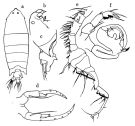 issued from : O. Tanaka in Publs Seto Mar. Biol. Lab., 1964, XII (3). [p.260, Fig.234]. Female: a, habitus (dorsal); b, forehead (right lateral side); c,last thoracic segment and urosome right lateral side); d, P5. Nota: A1reaches back to the 3rd thoracic segment. Male: e, A1 (portion with clasping); f, P5. Nota: The urosome segments and furca are in the proportional lengths as 27:13:18:7:5:30 = 100.
|
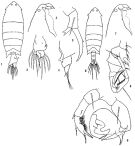 issued from: Q.-c Chen & S.-z. Zhang in Studia Marina Sinica, 1965, 7. [Pl.44, 1-9]. Female (from E China Sea): 1, habitus (dorsal); 2, forehead (lateral); 3, urosome (another specimen), dorsal: 4, idem (lateralleft side); 5, right P5 (posterior). Male: 6, habitus (dorsal); 7, forehead (lateral); 8, distal part of right A1; 9, P5 (posterior).
|
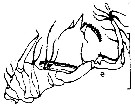 issued from : E.G. Silas & P.P. Pillai in J. mar. biol. Ass. India, 1973 (1976), 15 (2). [p.824, e]. Male (from Indian Ocean): e, right A1. Scale as in Calanopia minor.
|
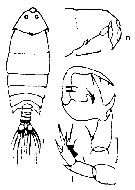 issued from : E.G. Silas & P.P. Pillai in J. mar. biol. Ass. India, 1973 (1976), 15 (2). [p.823, Fig.21, i-j, n]. Male: i, habitus (dorsal); j, P5; n, forehead (lateral). Scale as in Calanopia minor.
|
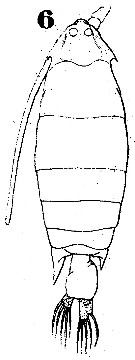 Issued from : W. Giesbrecht in Systematik und Faunistik der Pelagischen Copepoden des Golfes von Neapel und der angrenzenden Meeres-Abschnitte. – Fauna Flora Golf. Neapel, 1892. Atlas von 54 Tafeln. [Taf.40, Fig.6]. Female: 6, habitus (dorsal).
|
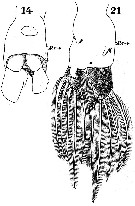 Issued from : W. Giesbrecht in Systematik und Faunistik der Pelagischen Copepoden des Golfes von Neapel und der angrenzenden Meeres-Abschnitte. – Fauna Flora Golf. Neapel, 1892. Atlas von 54 Tafeln. [Taf.40, Figs.14, 21]. Female: 14, urosome (ventral); 21, idem (dorsal).
|
 Issued from : W. Giesbrecht in Systematik und Faunistik der Pelagischen Copepoden des Golfes von Neapel und der angrenzenden Meeres-Abschnitte. – Fauna Flora Golf. Neapel, 1892. Atlas von 54 Tafeln. [Taf.40, Fig.34]. Female: 34, forehead (lateral).
|
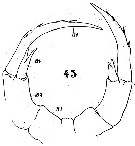 Issued from : W. Giesbrecht in Systematik und Faunistik der Pelagischen Copepoden des Golfes von Neapel und der angrenzenden Meeres-Abschnitte. – Fauna Flora Golf. Neapel, 1892. Atlas von 54 Tafeln. [Taf.24, Fig.43]. Female: 43P5 (anterior view).
|
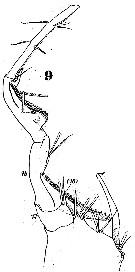 Issued from : W. Giesbrecht in Systematik und Faunistik der Pelagischen Copepoden des Golfes von Neapel und der angrenzenden Meeres-Abschnitte. – Fauna Flora Golf. Neapel, 1892. Atlas von 54 Tafeln. [Taf.24, Fig.9]. Male: right A1 (distal part).
|
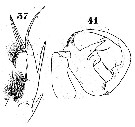 Issued from : W. Giesbrecht in Systematik und Faunistik der Pelagischen Copepoden des Golfes von Neapel und der angrenzenden Meeres-Abschnitte. – Fauna Flora Golf. Neapel, 1892. Atlas von 54 Tafeln. [Taf.24, Figs.37, 41]. Male: 37, left P5 (distal part); 41, right P5 (posterior view).
|
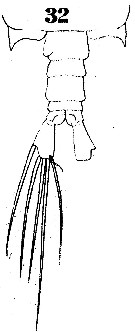 Issued from : W. Giesbrecht in Systematik und Faunistik der Pelagischen Copepoden des Golfes von Neapel und der angrenzenden Meeres-Abschnitte. – Fauna Flora Golf. Neapel, 1892. Atlas von 54 Tafeln. [Taf.40, Fig.32]. Male: 32, Th5 and urosome (dorsal).
|
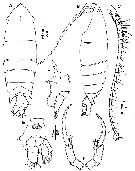 issued from : H.G. Jeong, H.-L. Suh, Y.H. Yoon, I.H. Choi & H.Y. Soh in Ocean Sc. J., 2008, 43 (2). [p.92, Fig.2]. Female Type I (from SE Korea): A, habitus (dorsal and lateral, respectively); C, A1; D, urosome (lateral, right side); E, urosome (ventral);
|
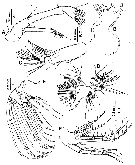 issued from : H.G. Jeong, H.-L. Suh, Y.H. Yoon, I.H. Choi & H.Y. Soh in Ocean Sc. J., 2008, 43 (2). [p.94, Fig.3]. Female Type I: A, A2; B, Md (mandibular gnathobase); C, Md (mandibular palp); D, Mx1; E, Mx2; F, Mxp.
|
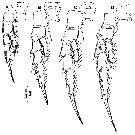 issued from : H.G. Jeong, H.-L. Suh, Y.H. Yoon, I.H. Choi & H.Y. Soh in Ocean Sc. J., 2008, 43 (2). [p.95, Fig.4]. Female Type I: A-D, P1 to P4 (left legs).
|
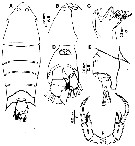 issued from : H.G. Jeong, H.-L. Suh, Y.H. Yoon, I.H. Choi & H.Y. Soh in Ocean Sc. J., 2008, 43 (2). [p.96, Fig.5]. Female Type II (from SE Korea): A, habitus (dorsal); B, forehead (lateral); C, Md (cutting edge); D, urosome (ventral); E, idem (lateral, left side); F, P5.
|
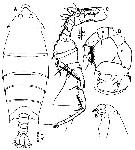 issued from : H.G. Jeong, H.-L. Suh, Y.H. Yoon, I.H. Choi & H.Y. Soh in Ocean Sc. J., 2008, 43 (2). [p.97, Fig.6]. Male: A, habitus (dorsal); B, forehead (lateral); C, right A1; D, P5.
|
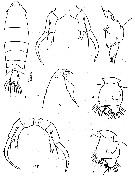 issued from : Z. Zheng, S. Li, S.J. Li & B. Chen in Marine planktonic copepods in Chinese waters. Shanghai Sc. Techn. Press, 1982 [p.76, Fig.44-1]. Female: a, habitus (dorsal); b, forehead (lateral); c, urosome (lateral, right side); d, idem (dorsal, form A); e, idem (dorsal, form B); f, P5; g, P5 (form A).
|
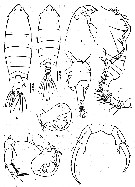 issued from : Z. Zheng, S. Li, S.J. Li & B. Chen in Marine planktonic copepods in Chinese waters. Shanghai Sc. Techn. Press, 1982 [p.77, Fig.44-2]. Female: h, habitus (dorsal); i, urosome (lateral, left side); j, P5. Male: k, habitus (dorsal); l, forehead (lateral); m, A1; n, P5; o, distal segments of right P5. Scale bars in mm.
|
 issued from : C.B. Wilson in Bull. U.S. natn Mus., 1950, 100, 14 (4). [Pl.17, Figs.207-214]. Female (from Pacific): 207-208, habitus (dorsal and lateral, respectively): 209,posterior prosome and urosome (dorsal); 210, urosome (ventral); 211, P5. Male: 212, habitus (dorsal); 213, right A1; 214, P5.
|
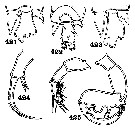 issued from : C.B. Wilson in Bull. U.S. natn Mus., 1950, 100, 14 (4). [Pl.28, Figs.421-425]. Female: 421, posterior prosome and urosome (dorsal); 422, idem (dorsal; another specimen); 423, idem (dorsal; another specimen); 424, P5.
|
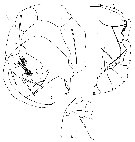 issued from : G.D. Grice in Fish. Bull. Fish and Wildl. Ser., 1962, 61. [p.238, Pl.34, Fig.1-3]. Male (from equatorial Pacific): 1, forehead (lateral); 2, distal end of right A1; 3, P5. Remarks: Both sexes have a large lens situated at the base of the rostrum.
|
 Issued from : G.S. Brady in Rep. Scient. Results Voy. Challenger, Zool., 1883, 8 (23). [Pl. XLV, Figs.1-9].
|
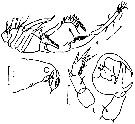 issued from : P.P. Pillai in J. mar. biol. Ass. India, 1975, 17 (2). [p.132, Fig.1, J-L]. Male (from Indian Ocean): J, cephalon (lateral); K, right A1; L, P5. Scale bar : 0.3 mm.
|
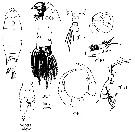 Issued from : J.M. Bradford-Grieve, E.L. Markhaseva, C.E.F. Rocha & B. Abiahy in South Atlantic Zooplankton, edit. D. Boltovskoy. 1999, Vol. 2, Copepoda; [p.1071, Fig. 7.396: Pontella securifer]. Ur = urosome; B = basis; r = right leg; l = left leg. Female characters (from key, p.959): - Genital segment left side with small dorsolateral projection at midlength and posterodorsal, narrow, hooked projection covering part of left caudal ramus; right side with small dorsal projection just posterior to midlength. - Genital segment is not covered in irregulag ridges bur has specific processes; left corner of prosome does not extend to posterior border of geni-tal segment. - Caudal rami unequal, enlarged on right side. Male characters (from key, p.960): - chelate right P5 exopodal segment1-2 with 2 large projections besides 'thumb', one long and triangular, the other a smaller rounded lobe.
| | | | | Compl. Ref.: | | | Cleve, 1904 a (p.195); Wilson, 1942 a (p.203); Oliveira, 1945 (p.191); Sewell, 1948 (p.323, 451, 465); Krishnaswamy, 1953 (p.136); Kott, 1957 (p.6); Sherman, 1963 (p.216: fig.2, p.220: fig.9, p.223: fig.13, p.224: fig.14); Heinrich, 1964 (p.86: fig.4); Fleminger, 1967 a (tabl.1); Heinrich, 1974 (p.44, fig.2); Patel, 1975 (p.660); Weikert, 1975 (p.142, carte); Carter, 1977 (1978) (p.36); Ganapati & Shanthakumari, 1962 (p.9, 16); Sherman & Schaner, 1968 (p.583, fig.1); Brodsky, 1972 (p.256); Bainbridge, 1972 (p.61, Appendix Table I: vertical distribution vs day/night); Grice & Gibson, 1978 (p.23, tab.8); Dessier, 1979 (p.206, as securifrons); Turner & al., 1979 (p.289, Tab.3); Chen Q-c, 1980 (p.795); Vives, 1982 (p.295); De Decker, 1984 (p.317); Guangshan & Honglin, 1984 (p.118, tab.); Brenning, 1985 a (p.28, Table 2); Madhupratap & Haridas, 1986 (p.105, tab.1); Brenning, 1987 (p.30, Rem.); Diouf & Diallo, 1987 (p.260); Hernandez-Trujillo, 1989 (tab.1); 1989 a (tab.1); Mizushima, 1990 (fig.2, 3, tab.2); Othman & al., 1990 (p.561, 564, Table 1); Baessa De Aguiar, 1991 (1993) (p.107); Suarez & Gasca, 1991 (tab.2); Suarez, 1992 (App.1); Tiwari & Nair, 1993 (p.67); Hernandez-Trujillo, 1994 (tab.1); Shih & Young, 1995 (p.72); Suarez-Morales & Gasca, 1997 (p.1525); Alvarez-Cadena & al., 1998 (tab.2,4); Suarez-Morales & Gasca, 1998 a (p.110); Lopez-Salgado & al., 2000 (tab.1); Kazmi, 2004 (p.229); Rakhesh & al., 2006 (p.93, Table 2, spatial distribution); Dur & al., 2007 (p.197, Table IV); Medellin-Mora & Navas S., 2010 (p.265, Tab. 2); Pillai H.U.K. & al., 2011 (p.239, Table 3, vertical distribution); in CalCOFI regional list (MDO, Nov. 2013; M. Ohman, comm. pers.); Jagadeesan & al., 2013 (p.27, Table 3, seasonal distribution); Palomares-Garcia & al., 2018 (p.178, Table 1: occurrence) | | | | NZ: | 15 | | |
|
Distribution map of Pontella securifer by geographical zones
|
| | | | | | | | | | | | 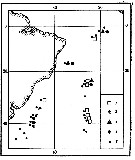 Issued from : A.K. Heinrich inTrudy Inst. Okeanol., 1974, 98 [p.44, Fig.2]. Issued from : A.K. Heinrich inTrudy Inst. Okeanol., 1974, 98 [p.44, Fig.2].
Distibution of four species of Pontellidae from SW Atlantic (Cruise of the R/V 'Akademik Kurchatov' 1971 and 1972).
Points = stations; square= Pontella atlantica ; asterisk= Pontella marplatensis ; triangle= Pontella securifer; circle = Pontellopsis perspicax. |
 issued from : H.G. Jeong, H-L. Suh, Y.H. Yoon, I.H. Choi & H.Y. Soh in Ocean Sc. J., 2008, 43 (2). [p.99, Fig.8]. issued from : H.G. Jeong, H-L. Suh, Y.H. Yoon, I.H. Choi & H.Y. Soh in Ocean Sc. J., 2008, 43 (2). [p.99, Fig.8].
Distribution of Pontella securifer based on previous records and on the present study. |
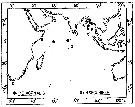 issued from : P. Pillai in J. mar. biol. Ass. India, 1975, 17 (2). [p.140, Fig.5]. issued from : P. Pillai in J. mar. biol. Ass. India, 1975, 17 (2). [p.140, Fig.5].
Occurrence of Pontella diagonalis and Pontella securifer collected from 54 stations in the Indian Ocean (See in: Hand Book to the International Zooplankton Collections, volume I, 1969). |
| | | | Loc: | | | South Africa (E & W), off Angola, G. of Guinea, off NE St. Paul Is., Roxo Cape, Casamance, Dakar, off Cape Verde Is., off Mauritania, off W Azores, ? Patagonia, off N Brazil, off Amazon, Caribbean Sea, Caribbean Colombia, Yucatan, Yucatan (Ascension Bay), G. of Mexico, Florida, Woods Hole, Georges Bank, ? off SE Nova Scotia, Medit. (off Malta Is.), G. of Aden, G. of Oman, Arabian Gulf, Arabian Sea, Laccadive Is., Maldive Is., Sri Lanka, Natal, Indian, India (Saurashtra coast, Bombay, Madras, Gulf of Mannar, Palk Bay, Lawson's Bay), Bay of Bengal, Nicobar Is., Barren Island, Indonesia-Malaysia, Philippines, Gulf of Tonkin, Hong Kong, China Seas (East China Sea, South China Sea), Taiwan (SW), S Korea, Japan (Bungo Channel), Pacif. (W equatorial), Australia (G. of Carpentaria, SE, Great Barrier, New South Wales), off Hawaii, ? Puget Sound, W Baja California, La Paz, G. of California, W Colombia, off Peru, S Galapagos | | | | N: | 98 | | | | Lg.: | | | (16) F: 4,55-3,8; M: 4,2-3,65; (34) F: 4,14; (35) F: 4,2-4,02; M: 4,08-3,6; (45) F: 4,5-4,25; M: 4,1-3,85; (46) F: 4,4; M: 4,1; (73) M: 4,1; (101) F: 4,46; 4,4; M: 4,4; (104) M: 4,3; (120) F: 4,38-4,07; M: 4-3,62; (137) F: 4,5-4,25; M: 4,1; (256) M: 4,02-3,62; (290) F: 3,9-4; M: 3,4-3,65; (530) F: 3,6; M: 3,4; (807) F: 4,3-3,87; M: 4-3,7; (1021) F: 3,73-4,07; 3,61-3,67; M: 3,2-3,51; (1023) F: 3,89-4,26; M: 4,04-4,63; (1110) M: 4,64; (1115) M: 3,7-4,45; {F: 3,60-4,55; M: 3,20-4,64} | | | | Rem.: | epiplagic.
According to Silas & Pillai (1973, p.823) the records of this species from Puget Sound (Sewell, 1947, p.250) and from Woods Hole (Wilson, 1932) are doubtful, because for Vervoort (1965) the distribution range of this species in Pacific and Atlantic is between 35°N to 35°S.
P. securifer, P. diagonalis and P. spinipes are closely allied belonging to a "species group".
Jeong & al (2008 b, p.95) point to the occurrence of two morphological types of female in China Sea (female type I and 2 illustrated in figures 2-5). For the authors, in the female originally described from Mid-Pacific Ocean some meaningful morphological variations were found in the genital compound somite (Brady, 1883; Wilson, 1950; Chen & Zhang, 1965); however, Wilson (1950) suggested that P. secirifer is a single species because the male has no inclination toward variation. Zheng & al. (1982) divided females from the East China Sea into two types by characteristic features in their habitus, genital compound somite and P5. There is a little difference between Korean and Chinese individuals: last pedigerous somite of type I from Korean waters is asymmetrical while that of Chinese waters almost symmetrical; P5 type II from Korean waters is asymmetrical while that of Chinese waters almost symmetrical. Although these differences might be in a species level, the authors retain two types as in Zheng & al.'s suggestion, in that male of only single type is found. It is necessary to reexamine by such methods as molecular analysis to verify ist taxonomic position. Meanwhile, type I is identical with illustrations of P. securifer provided by Tanaka (1964) and Brady (1883) and type II is similar to figures of Gisebrecht (1892). | | | Last update : 13/11/2020 | |
|
|
 Any use of this site for a publication will be mentioned with the following reference : Any use of this site for a publication will be mentioned with the following reference :
Razouls C., Desreumaux N., Kouwenberg J. and de Bovée F., 2005-2026. - Biodiversity of Marine Planktonic Copepods (morphology, geographical distribution and biological data). Sorbonne University, CNRS. Available at http://copepodes.obs-banyuls.fr/en [Accessed February 08, 2026] © copyright 2005-2026 Sorbonne University, CNRS
|
|
 |
 |





























